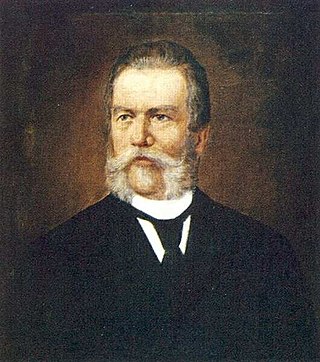Related Research Articles

Georg Carabelli, Edler von Lunkaszprie was a prominent Hungarian dentist and professor of dental surgery in Vienna. He held a minor noble rank, which referenced the town of Lunkaszprie.

János Fogarasi was a Hungarian jurist and philologist, born at Kázsmárk, Borsod-Abaúj-Zemplén County in northeastern Hungary.
János Aczél was a royal secretary and poet.

Baron Péter Apor de Altorja (1676–1752) was a Hungarian count (főispán) and historian. He was a member of the aristocratic Apor family.
Martin Szentiványi was a polymathic Hungarian Jesuit writer and theologian. His 4000 page work, titled Miscellanea, brings papers from all fields of science.

Ferenc Révay de Szklabina et Blatnicza, was the Palatinal Governor in the Kingdom of Hungary, thus was ranking third to the Kings Number.
János Füzi was a Unitarian minister, teacher.

Count Emil Dessewffy de Csernek et Tarkeő was a Hungarian conservative politician, leader of the Conservative Party, who served as President of the Hungarian Academy of Sciences from 1855 until his death.
Károly Salbeck of Petris (Galați Moldova, today Romania 17 November 1725 – Lőcse, Hungary was a doctor of theology, bishop of Szepes County, brother of Ferenc Salbeck and Mihály Salbeck.
Salbeck Mihály was a doctor of philosophy, priest of the Society of Jesus, teacher, brother of Ferenc Salbeck and Károly Salbeck.
Baron István Andrássy de Csíkszentkirály et Krasznahorka was a Hungarian author and nobleman. He was a member of the old aristocrat Andrássy family.
József Ágoston de Kisjóka was a Hungarian lawyer and Member of Parliament (MP).
Pál Bajai, OFM, was a Hungarian Franciscan friar of the Observant reform and spiritual writer during the 18th century. His only surviving work is De gratiis atque beneficiis beatissimae V. Mariae Reginae in Ungaria, published in 1766.

Judit Dukai Takách (1795–1836) was a Hungarian poet. She was known by her pseudonym, Malvina.

János Vajda was a Hungarian poet and journalist. His first poetry was published in Életképek in 1844. He was a member of the Kisfaludy Society.

Viktor Rákosi, also known under his pseudonym Sipulusz, was a Hungarian writer, journalist, humorist, member of parliament, and sport leader. His siblings include actor Szidi Rákosi and fellow writer Jenő Rákosi.

Anna Wesselényi (1584–1649), was a Hungarian countess and writer. Her correspondence has been published.
Pál Hamar of Nemespann and Gyöngyöshalász was a lawyer and writer.

The Life and works of Hungarian writers is a lexicon of Hungarian literature written at the turn of the century by József Szinnyei. The 14-volume work, published between 1891 and 1914, sought to bring together all those who had published a literary work published in their hands. The life and work of Hungarian writers is still a masterpiece and one of the greatest simple literary works.
Arthur John Patterson was a British academic and member of the Hungarian Academy of Sciences. He was an academic at the Faculty of Humanities of the Eötvös Loránd University.
References
- ↑ "Yolland Arthur Battishill, | Magyar írók élete és munkái – Szinnyei József | Reference Library". www.arcanum.com. Retrieved 2022-09-26.
- ↑ Hegedűs, Gyula (2011). Magyar–angol kapcsolatok, 1944–1956 (PDF) (in Hungarian).
- ↑ "THE SCHOOL OF ENGLISH AND AMERICAN STUDIES". seas3.elte.hu. Retrieved 2022-09-30.
- ↑ "Yolland, Arthur B. (Arthur Battishill) 1874-". WorldCat Identities. 26 September 2022.
- ↑ "Yolland Arthur Battishill, | Magyar írók élete és munkái – Szinnyei József | Reference Library". www.arcanum.com. Retrieved 2022-09-26.